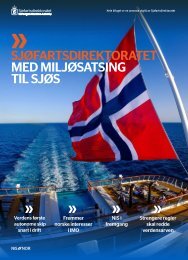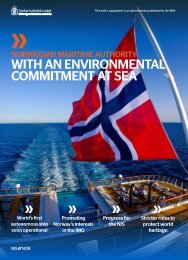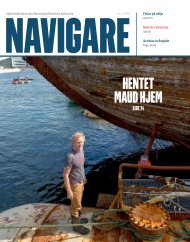Navigare 2 - 2018
Create successful ePaper yourself
Turn your PDF publications into a flip-book with our unique Google optimized e-Paper software.
EDITORIAL<br />
ENGLISH TRANSLATION FROM PAGE 4<br />
70 years for safe shipping<br />
Shipping is international by nature. Throughout<br />
history, use of the oceans as trading<br />
routes has given people and nations the<br />
opportunity to trade goods and thereby<br />
secure prosperity and development. In spite<br />
of cars, the railway and airplanes, ships are<br />
still responsible for 90 percent of the world’s<br />
transportation of goods.<br />
It soon became clear that there was a<br />
need for international rules and regulations<br />
to secure the growth of the industry. From<br />
the mid 1800s and onwards, several<br />
attempts were made to establish international<br />
rules, but without success. After the<br />
shipwreck of Titanic, another attempt was<br />
made, and the first great international<br />
agreement or convention on safety at sea,<br />
SOLAS (Safety of Life at Sea), was<br />
successfully implemented. Even though this<br />
convention in many ways still is the<br />
constitution of international shipping, it was<br />
only when IMO, the UN’s specialised<br />
agency on maritime issues, started its work,<br />
that systematic work began to regulate<br />
shipping internationally.<br />
It is now 70 years since the UN’s specialised<br />
agency on maritime issues, IMO, was<br />
established. After a rather slow start, IMO<br />
has become increasingly more important for<br />
the international maritime industry. Today,<br />
IMO is crucial and without comparison, the<br />
most important forum for international<br />
shipping. The main objective of IMO has<br />
been to implement international rules and<br />
regulations to increase safety at sea, to make<br />
it safer for those who work onboard ships,<br />
and to reduce the number of shipping accidents.<br />
In recent years, IMO has become<br />
increasingly more engaged in environmental<br />
issues, and the reduction of the negative<br />
affect the maritime industry has on the<br />
marine environment has topped the agenda.<br />
IMO has also been crucial in the work to<br />
ensure equal conditions for competition.<br />
Through common rules and regulations, as<br />
Olav Akselsen<br />
Director General of Shipping<br />
and Navigation<br />
well as the same enforcement thereof, the<br />
standard of ships has increased. It has also<br />
prevented individual owners or countries<br />
from being able to cut corners when it<br />
comes to the ships’ standard.<br />
IMO consists of 173 member states. In<br />
addition, all the most important organizations<br />
within shipping are represented when<br />
new rules and regulations are developed or<br />
old ones amended. IMO has passed more<br />
than 150 so-called instruments, regulating<br />
everything from the equipment required on<br />
board the vessel to rules concerning navigation<br />
or education and resting time.<br />
The processes in IMO can take time and<br />
sometimes be frustrating to witness. The<br />
work on new regulations on ballast water<br />
management is an example of a process that<br />
has taken too long. At the same time, IMO<br />
is one of the most active and effective agencies<br />
in the UN. Also, resolutions made in<br />
IMO have a direct impact on the maritime<br />
industry and it is therefore important that a<br />
resolution is thoroughly examined before it<br />
is implemented.<br />
In Norway and Norwegian shipping,<br />
IMO is very important. Ships registered in<br />
Norway operate all over the world and<br />
many never visit Norwegian waters or<br />
Norwegian harbours. National regulations<br />
are therefore not suitable to regulate<br />
Norwegian shipping. National special<br />
regulations may be an hindrance in the<br />
competition with others and cause a change<br />
of flag. International regulations on the<br />
other hand, ensure equal conditions for<br />
competition.<br />
Since the establishment of IMO, we have<br />
had a tremendous decrease in the number<br />
of shipping accidents. Naturally, there are a<br />
number of reasons for this decrease. New<br />
and better technology is important, but<br />
diligent work through IMO and resolutions<br />
to improve training, technical minimum<br />
standards, and new regulations have definitely<br />
also had a tremendously positive effect.<br />
IMO is well on its way to succeed in its<br />
most important assignment; making<br />
shipping more safe.<br />
58 | <strong>Navigare</strong> 2 - <strong>2018</strong>


















